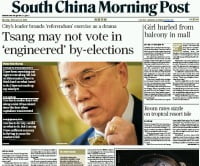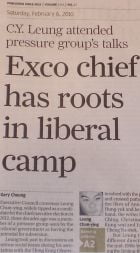 The Standard’s lead story today is about the woman who hurled herself and her four-year-old child from the seventh level of a shopping mall. Among other things, the tragedy appears to be yet another unambiguous thumbs-down for Hong Kong’s local education system. The South China Morning Post shoves the gore to one side and reports that Chief Executive Donald Tsang is agonizing over whether to vote in the Great By-Election Referendum Uprising Saga of 2010. With Beijing’s local agents organizing a United Front boycott and establishment tut-tutting campaign – even General Chamber of Commerce chairman Andrew Brandler has been enlisted to whine about how horrid it all is – it is hard to see Sir Bow-Tie exercising his democratic right on this occasion. But if he declares that he won’t vote, how many people will be spurred into going along to the polling station just to show what they think of him?
The Standard’s lead story today is about the woman who hurled herself and her four-year-old child from the seventh level of a shopping mall. Among other things, the tragedy appears to be yet another unambiguous thumbs-down for Hong Kong’s local education system. The South China Morning Post shoves the gore to one side and reports that Chief Executive Donald Tsang is agonizing over whether to vote in the Great By-Election Referendum Uprising Saga of 2010. With Beijing’s local agents organizing a United Front boycott and establishment tut-tutting campaign – even General Chamber of Commerce chairman Andrew Brandler has been enlisted to whine about how horrid it all is – it is hard to see Sir Bow-Tie exercising his democratic right on this occasion. But if he declares that he won’t vote, how many people will be spurred into going along to the polling station just to show what they think of him?
 Of more interest was the SCMP’s front page on Saturday, which breathlessly reported a story that is… 30 years old. Leung Chun-ying, Executive Council member and over-eager aspirant to succeed Donald, was a member of the Hong Kong Observers back in the late 1970s and early 80s. This has been common knowledge ever since anyone got to hear of Leung; nor is it remotely surprising, unless viewed through a very narrow contemporary lens.
Of more interest was the SCMP’s front page on Saturday, which breathlessly reported a story that is… 30 years old. Leung Chun-ying, Executive Council member and over-eager aspirant to succeed Donald, was a member of the Hong Kong Observers back in the late 1970s and early 80s. This has been common knowledge ever since anyone got to hear of Leung; nor is it remotely surprising, unless viewed through a very narrow contemporary lens.
The Observers were not exactly the post-80s generation of their time. It was a colonial era when the patriotic, pro-Beijing camp was a tiny, self-contained, almost-criminalized group of extremists shunned by apolitical mainstream society, rejected by most employers and harassed by security agencies. Outside of that circle, there was no real divide between pro- and anti-establishment, at least as we now know it. The young professionals who formed what was essentially a discussion group about Hong Kong’s future were daring, perhaps, just for gathering, but hardly radical.
Like the group Meeting Point, formed by ex-students, the middle-class Observers included not only figures who went on to become pro-dems but future conservatives, including more than one Executive Council member. This milieu of early civic awareness included future Liberal Party founders Selina Chow and Allen Lee, not to mention current CY Leung supporter and rabid scourge of dissidents, columnist Lau Nai-keung. Why doesn’t the SCMP mention this? Because the idea is to burnish CY Leung’s credentials as a progressive man of the people.
And why would the SCMP want to do that? To put it another way: who put that story on the front page? Robert Kuok, who owns the SCMP is not really a Leung sort of guy; the tycoons, especially those with property interests, do not like CY one bit. Maybe the younger Kuoks are getting friendly just in case Beijing makes him, rather than blue-blood Henry Tang, the next CE. Maybe the SCMP’s editor has a soft spot for CY. Maybe CY’s people got to the reporter who wrote the story, and his bosses ran with it because there was nothing else going on. The point is, the ‘story’ is there because someone wanted it there.
At least they didn’t claim it was an exclusive.

Tsang may well be creating a precedent that could end up biting him. If as he say’s, by exercising his right not to vote, he is making a statement, what if HK en masse avoids voting in a Government organised vote of some kind. Would that then mean such a low turnout was a reflection of how the people felt about Tsang’s administration? He can’t have it both ways.
Next thing you know the SCMP will run an article revealing that Donald Tsang was a mid-level civil servant 30 years ago. Who knew?
Apparently, the SCMP was a newspaper 30 years ago….
Must be a slow news day today.
I remember the HK Observers
Some things not mentioned in the Post’s CY story:
1 Nobody seriously thought at the time that the Observers were subversive. They were a middle class chat group. The fact that they appeared as number 2 on the SCOPG list just shows that the list was not compiled in order of importance. I remember a senior civil servant at the time complaining that no mid-levels dinner party was complete without an Observer on the guest list, demonstrating that the hostess was politically alert, open-minded, and willing to mix with the sort of Chinese people who could be trusted not to stand on the toilet seat. The Observers’position papers, which were long, very serious and rather boring, were actually published in the SCMPost, which then regarded itself as the Establishment’s newwspaper.
2. The Post dismissed the SCOPG report as a matter of little importance at the time, possibly because it was badly beaten to the story by the HK Standard.
Posties are the laziest journalists I ever met.
I gave them a copy of my book GAMES HONG KONG PEOPLE PLAY thinking they would read it and comment on it. They sent someone called Monica Gwee to interview me.
Lo and behold the next Sunday there were two whole pages of verbatim excerpts and next to nothing from them.
I was grateful of course – but why bother being interviewed by them? Just send them what you want to have printed.
I’m sure Government House does it all the time.
“Docta” George – take the adverts elsewhere mate, it’s getting a bit tired.
The book is no longer on sale so it is difficult to imagine the above as an advert.
Perhaps I should hide behind total anonymity. It’s safer in the dark nerd cyber nether-world after all and facilitates more trenchant sniping.
Oh, I bow down to your infinite Wisdom, Dr. Anonymous, for what am I but a poor beknighted, selfish, money-grubbing, shallow, vapid, vain, Chinese female? I, the Hong Kong Girl, now realize that I am far too stupid and irresponsible to be allowed to vote. I have seen the error of my ways! Oh thank you for pointing this out to me. Oh Great Gweilo, I shall be eternally grateful for your insight.
Perhaps the Essy Empie is talking up Leung’s credentials as a candidate just to help generate the appearance of a competitive election. Then when Beijing-supported Tang wins, we can all be told he was the people’s choice.